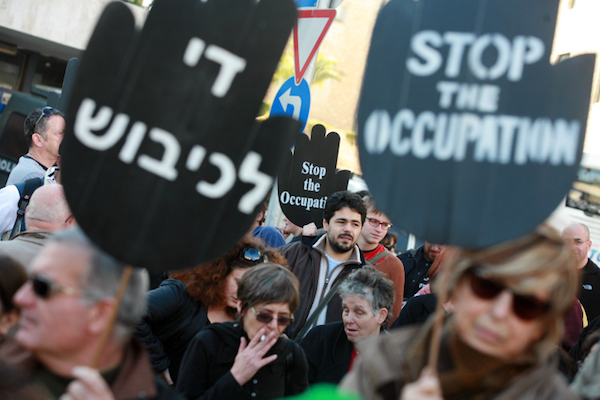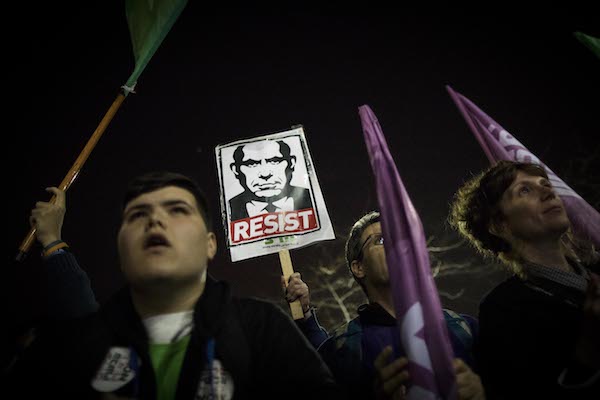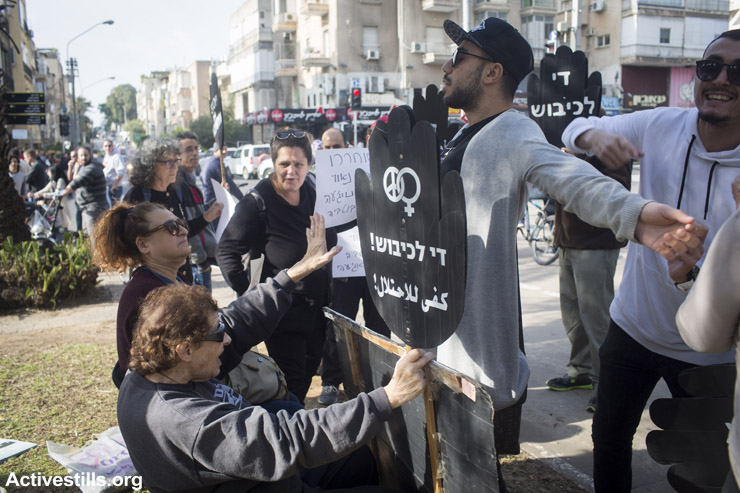After 50 years of a racist military regime, it’s time for the Israeli Left to go out and protest en masse — and, in the face of such an urgent task, to overlook our differences.

Things can sometimes be very simple. Read, for example, the following invitation to the anti-occupation protest taking place in Tel Aviv this Saturday night:
We will take to the streets en masse to protest against the absence of hope from the right-wing government, against the occupation, against violence and racism. This extremist group in the coalition, drunk on power, cannot be allowed to continue running riot, spreading hate and inciting against minorities, the media, the justice system and anyone who dares to criticize government policy.
We are about to mark 50 years of occupation. Fifty years of a racist military regime, which operates two separate legal systems in the West Bank — one for Jews and one for Palestinians. Fifty years in which Jerusalem has remained divided, although along national lines rather than recognized borders — separating citizens who get to build, receive services and take part in democracy, and those who suffer from systematic discrimination and home demolitions. Fifty years of Gaza seeing military rule replaced by a brutal siege and wars. Fifty years of destruction, killing and needless deaths.
Fifty years too many, as +972 Magazine’s project to mark half a century of occupation has been called. Fifty years that could have been prevented, and which we are obligated to bring to an end.
We are also witnessing the nonviolent uprising of hundreds of Palestinian prisoners, who have been on hunger strike for 40 days in a demand for the basic rights that Jewish prisoners (including security prisoners) already receive: protection from extended administrative detention with no trial; the right to telephone access (under supervision); the right to study in jail in order to lay a foundation for the future once they’ve been released; the right to visits. There has been a growing protest movement in support of the prisoners both in the occupied territories and among Palestinians in Israel; meanwhile, dozens of the hunger strikers are already under medical supervision and are entering a hazardous phase of their strike.

Where is the Israeli Left today, in the face of 50 years of occupation, 40 days of hunger strike and popular Palestinian protests? Where is its own protest against the occupation? Where is the mobilization against the Israeli consensus, which chooses the status quo of settlements, perpetual military rule, siege and racism? Where is the opposition to the anti-democratic processes being driven by this extreme right-wing government, which censors art, shuts down Palestinian movements, parties and media outlets on both sides of the Green Line, and incites against Arabs, journalists and those opposed to the occupation?
There are protests, here and there. There are people doing good work on a daily basis, in solidarity with prisoners, organizing against fascism in Jerusalem, protecting Palestinian shepherds from settler thugs in the south Hebron hills and in the Jordan Valley. But a strong public voice is also needed, and at the moment there is no loud, clear cry against the occupation from the Israeli public, or the Left, aside from this upcoming protest on Saturday evening. That’s a good enough reason to attend — the Left needs to be there together, Jews and Arabs, to shout out loud.
After half a century, a broad coalition is needed — despite its flaws
Yet there is also a critique to be made of this demonstration. As Yuval Eylon points out on Local Call, the organizers of Saturday’s march include the Labor and Meretz parties, whom he justifiably accuses of capitulating to and edging towards the Right, of collaborating with the occupation, of backing the delegitimization of Palestinian political movements and more.
But they won’t be the only ones at Saturday’s protest, and it’s not a demonstration in support of the Labor party. They weren’t the original organizers of the event — it’s a Peace Now initiative, which is also being organized by Standing Together, Combatants for Peace and the Parents Circle Families Forum. These groups stage grassroots Jewish-Arab, anti-occupation and anti-racist initiatives across the country.

Representatives from councils of unrecognized Bedouin villages in the Negev will also be at the protest, as will residents of Neve Shalom-Wahat al-Salam and numerous joint organizations from the Galilee. Palestinian and Mizrahi feminist groups will be represented, along with MachsomWatch. The list goes on. And there will be both Palestinian and Jewish speakers, including Joint List head Ayman Odeh and Eli Bitan, an editor at both Local Call and B’Hadrei Haredim, a major ultra-Orthodox news website.
Nonetheless, we mustn’t ignore the rightful criticisms of the event, above all the presence of Labor. The party bears huge responsibility for the occupation, settlements, wars and the military regime. It persecutes Palestinian citizens inside the Green Line, and stopped referring to itself as a left-wing party years ago.
To criticism of Labor must be added criticism of the army generals who “shoot and cry,” as well as those who engage in day-to-day racism, and then speak out against it in lofty tones. Most of the time, we must also struggle against the Zionist Union of which Labor is a part, and against its policies — the acquiescence to Operation Protective Edge, the attacks on the Islamic Movement and Balad, and so on.
But when these people are finally prepared to form part of a broad front against the occupation, to take to the streets once every few years to call for peace, hope, and end to racism and incitement — why not join them? The small, radical Jewish-Arab bloc on the Left cannot end the occupation alone. When a unified force is needed to make change, we are compelled to create alliances — even when there are disagreements over countless issues (such as the solution to the occupation).
The demonstration on Saturday is one of those instances. After 50 years too many, we need to show that there are still plenty of people here who are opposed to the occupation.
This post was originally published in Hebrew on Local Call. Translated by Natasha Roth.


